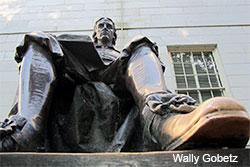Established in 1997, the Pembroke scholarship was named for William Shirley to honor both his career in colonial Massachusetts and the historical connections between Harvard and Pembroke. The group of Cambridge graduates that ventured to New England in the 17th century and who played a major role in the early history of Harvard came mostly from Puritan foundations -- John Harvard from Emmanuel, Henry Dunster and John Winthrop from Trinity, John Eliot from Jesus. Pembroke was not a hotbed of Puritanism and did not initially send many of its sons to the new Cambridge. However, a century later, William Shirley gave prominence to that link when he became the royal governor of Massachusetts in 1741 and in that capacity served as president of the Harvard Overseers.
Born in 1694, Shirley was admitted to Pembroke in 1710. He received his degree in 1714 and was called to the bar in London. After establishing himself professionally, Shirley, along with his wife, Lady Frances Barker, and their seven children emigrated to Boston in 1731 (two more children were born later). He carried a letter of introduction from the Duke of Newcastle to the Bay Colony's royal governor, Jonathan Belcher (Harvard, 1699), who recommended his admission to the Massachusetts bar.
Shirley established a law practice, was appointed an intern judge, and the following year, became advocate general. In 1741, the Duke of Newcastle named Shirley royal governor, a position he held until 1756.
With skill for compromise and for making political alliances, Shirley stabilized the colony's currency and built up its military defense. The most daring undertaking of his governorship was an attack on the French-held fortress of Louisbourg on Cape Breton Island in 1745. The New England fleet captured 2,000 French troops and lost only 100 men. A 1755 campaign to capture Fort Niagara from the French was unsuccessful, however. Lack of supplies, illness and winter conditions devastated the colonies' forces. Shirley lost two sons in the campaign.
Also in 1755, Shirley became commander in chief of British forces in America after the death of General William Braddock. Amid the controversy of the failed Canadian operations, Shirley was recalled to London and relieved of his governorship. Soon exonerated, he was appointed royal governor of the Bahamas from 1758 to 1767. In 1770, Shirley returned to his 37-acre Roxbury estate to live as a private citizen until his death the following year.
For more information about the college, please visit Pembroke College's website.

